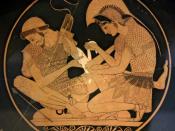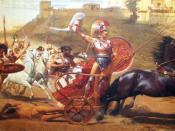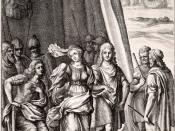Many excerpts from the Iliad by Homer deal with Achilles, but the one that truly sums him up is found in book eighteen, lines one-hundred and eleven to one-hundred and twenty one. This quotation says a lot about the behavior and character of Achilles. It reveals his temperament, attitude, perspectives, duties, and priorities. It highlights the extent to which anger, revenge, pride, and honor play in Achilles' life and, by extension, the entire epic. It also serves as a turning point in the narrative for Achilles, and consequently Hektor, the Trojans, and the Greeks. This excerpt embodies many of the themes of the poem and helps us understand Achilles' character and behavior.
"Sing, goddess, the anger of Peleus' son Achilleus and its devastation" (1:1-2). These opening lines of the Iliad by Homer really sum up Achilles and the entire epic as well. The Iliad, at first glance, seems to be a twenty-four chapter (book) novel about the Trojan War. Ostensibly the narrative poem is nothing more than a recollection of the events by Homer of the war between the Greeks and Trojans-but in reality it's much more than that. If the Iliad were simply an in-depth historical or mythological recounting of the events of the Trojan War than Homer would have began the epic with the beginning of the war, not during the ninth year of a ten year war. If the Iliad were about the Trojan War, it would have ended with the Trojan horse through which Troy was finally overtaken, or it would have ended with the death of Achilles by Paris. But it ended with Achilles giving permission to Priam to retrieve the body of his son, Hektor, and return it to Troy. Therefore the question arises: What is the crux of the Iliad since...


